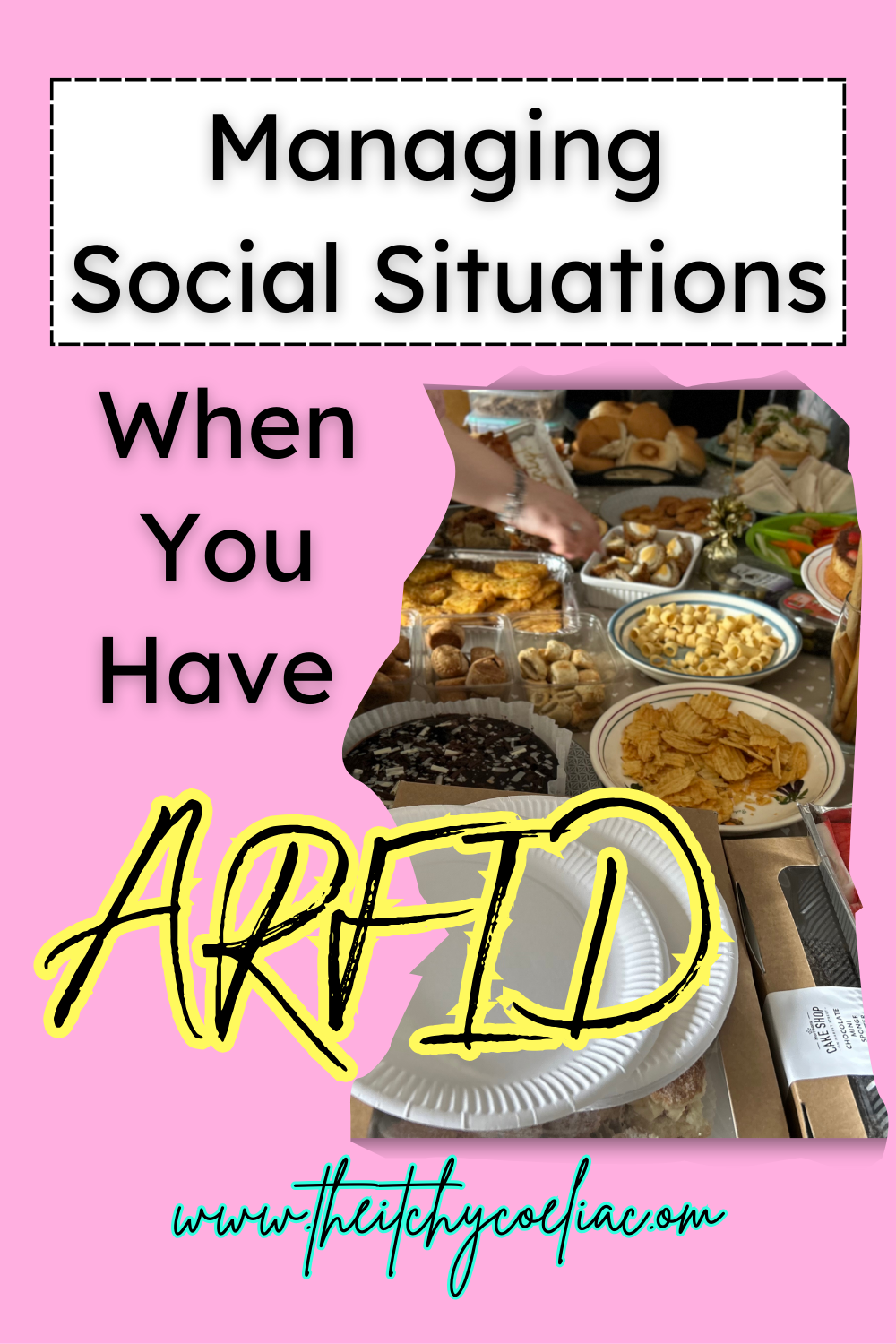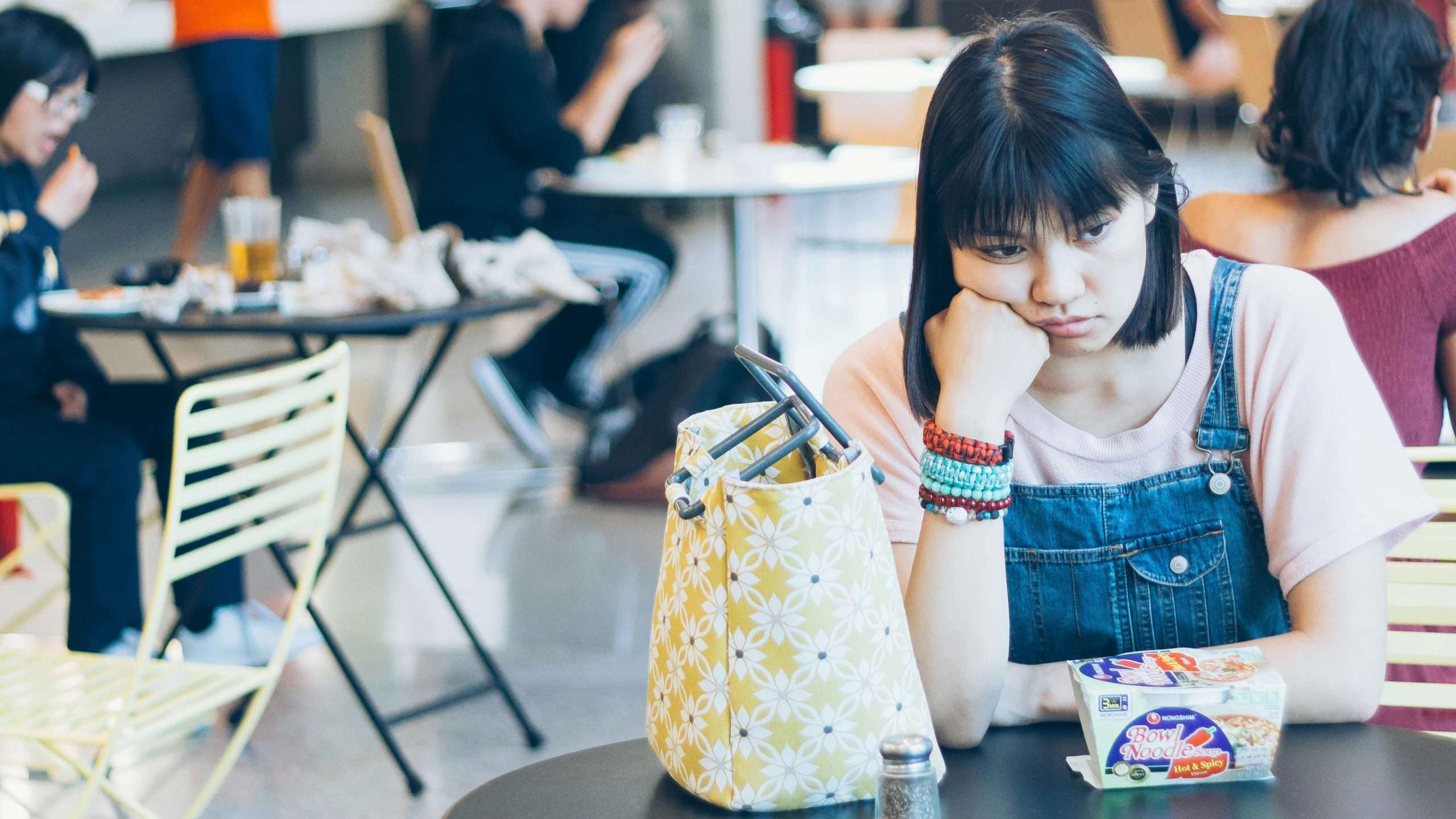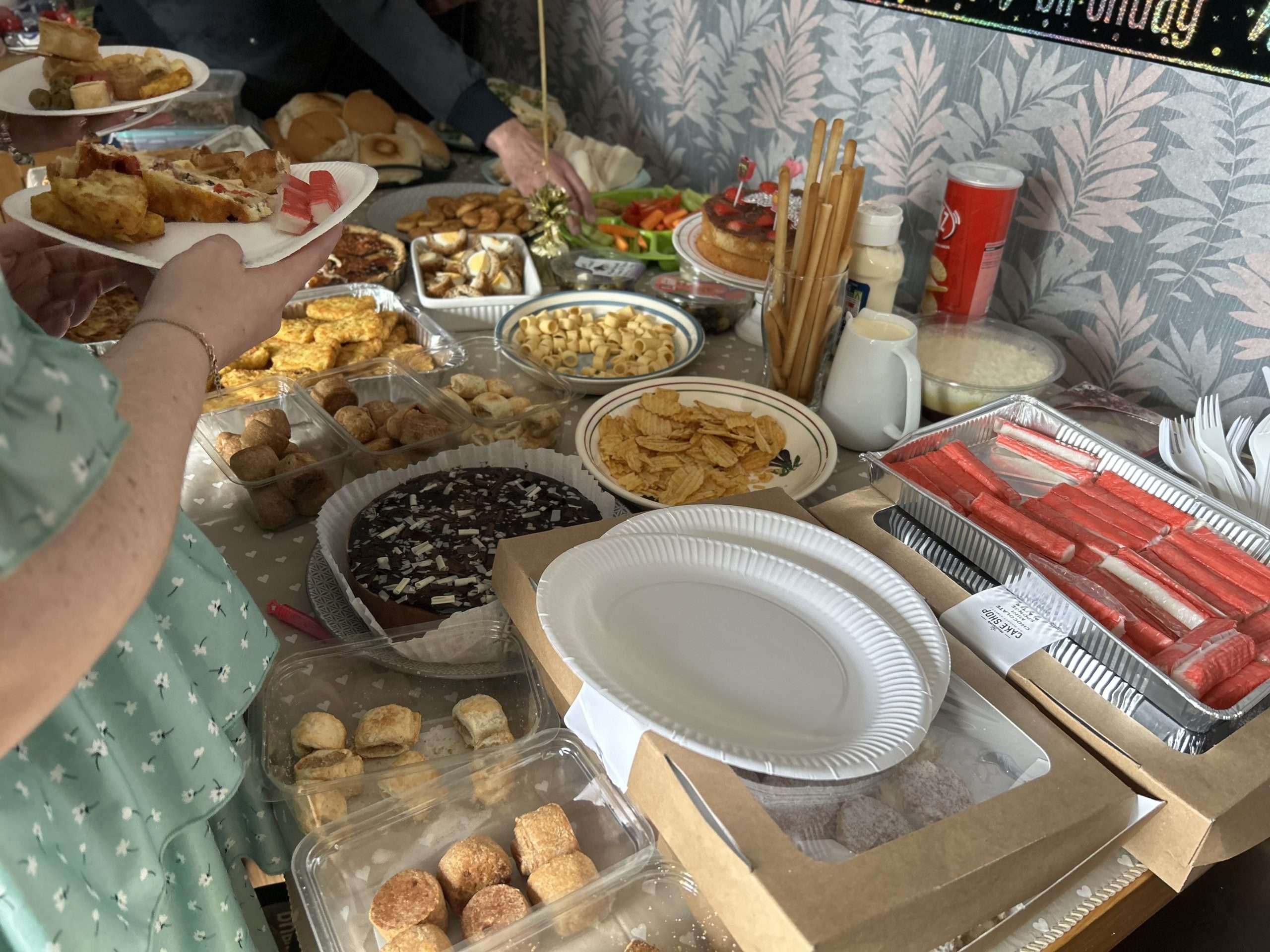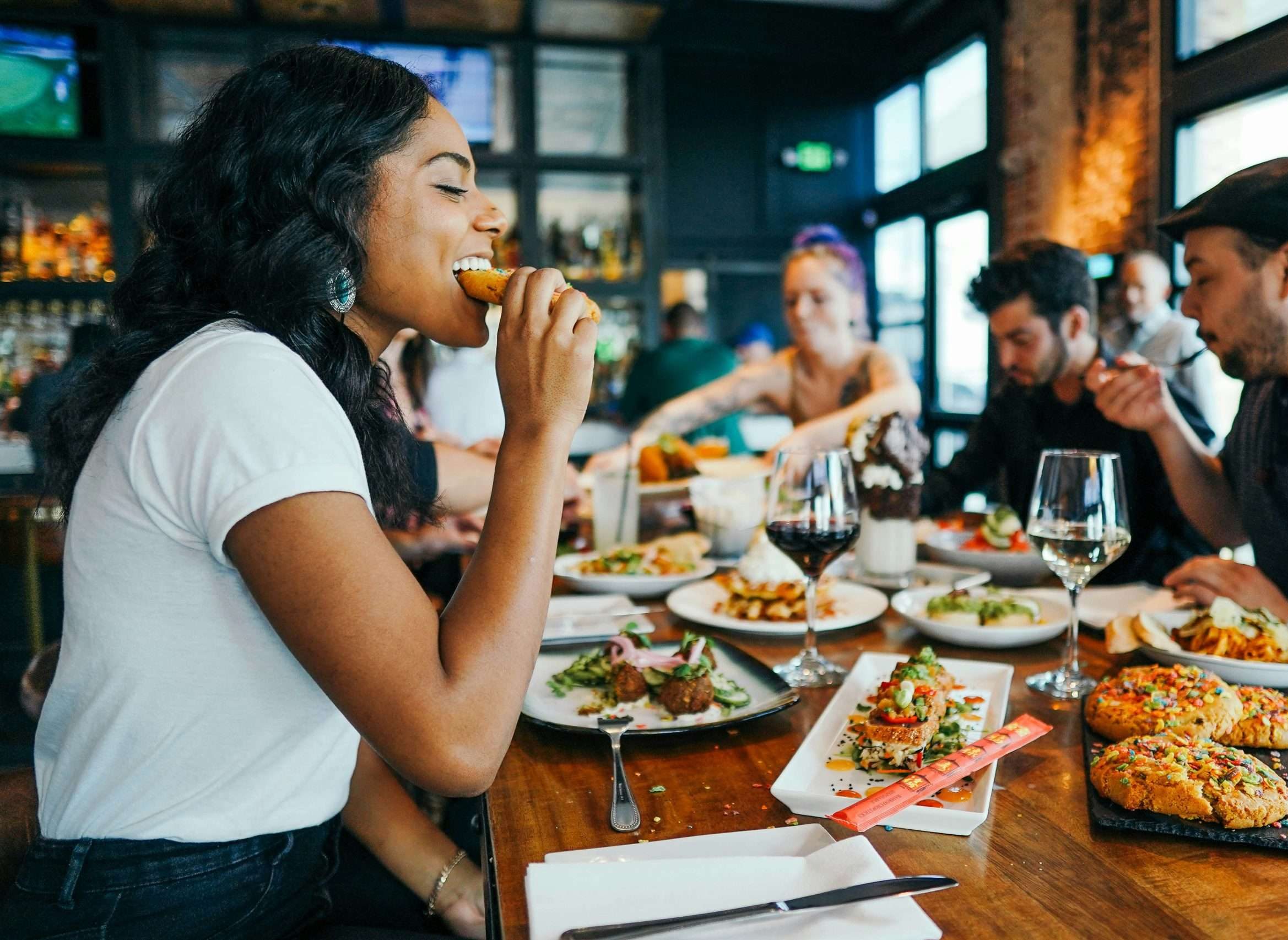When you have ARFID, something as simple as a social gathering can be really difficult. More often than not, food is involved. I wanted to explain a few times when social situations with ARFID was difficult and take a look at some ways that it can be made easier! Both by those around us and those of us with ARFID!
Why not pin it for later?

You can find out more on ARFID in my post ‘What is ARFID? Everything You Need To Know!‘
As I sat down to write this post, I was a little surprised at just how many memories sprung up of social situations I’ve struggled with. Having ARFID my whole life has meant I’ve had plenty of opportunities to see the impact it can have on your social life.
Being social with ARFID when you’re young…
Children’s birthday parties…every kid’s favourite way to spend a weekend…every parent’s nightmare. And as it turns out, they weren’t my favourite either!
Food is usually a big part of kids’ parties. When you have ARFID (even as a child) it can cause some issues. There’s no guarantee that you’re going to have something there that you can eat. Or even if there is one of your safe foods, it still could be really difficult to eat it.
I know for myself, I would have to hope that there would be pizza because there wasn’t really any other ‘party food’ that I would eat. And the pizza had to look right. If it looked slightly pale or the cheese wasn’t melted enough, or even if all the other kids’ hands had been touching near it then I wasn’t interested.
This meant that a lot of the time I would just sit to the side while everyone else ate. While I wasn’t particularly bothered by this, there was this feeling of jealousy, almost? Especially when the cake would get brought out and it would be the only thing for pudding!
It was also pretty evident during school. I never got school dinners. My parents knew there was no way I’d eat them so I always took a packed lunch. This normally consisted of bread and butter and some Walkers crisps.
I used to try and hide from the other kids the fact that there was no filling in my bread. And god forbid someone ask me the dreaded question, “what kind of sandwich do you have?”
This is something I did and would probably still do today. Even though I’m perfectly happy eating my bread and butter, there’s a kind of embarrassment because you know that to someone else it might look kind of weird.
Being social with ARFID in the workplace…
Having ARFID has made for some awkward conversations for me at work – that I usually just laugh off so I don’t have to go into it. There’s a lot of occasions where food is a factor whether it’s team meals or even just dinner times!
At a previous place of work, I relied heavily on what was around it. I was never very good at planning ahead so I very rarely took food from home. Instead, I would go to the sandwich shop up the road – and get chips. Or I would go to the Chinese place across the street – and get chips. And on Fridays it was fish shop Friday so obviously I would go to the fish and chip shop – and get chips. (This was before my Coeliac diagnosis.)
I was personally just glad to have a variety of chips around me – because chips are different depending on where you get them, don’t fight me on this. But all my work colleagues were baffled.
“Are you eating chips again?” They’d say. To which I’d normally just nervously smile, trying to laugh it off.
It became something of a joke that CC would always be eating chips for dinner. While I would play along and smile and take the banter, it was actually causing me a lot of anxiety.
I became worried they were all laughing at me, talking about me. Tutting at my unhealthy diet. Saying things like, “no wonder she’s big.” It just seemed like people always had something to say about what I was (or wasn’t) eating. But I just couldn’t find the words to explain that, for me, it was either chips or skip lunch altogether.
At my current job, the girls in the office suggested we go to Nandos for dinner. I had never eaten at Nandos before. I’d had a gander at their menu in the past and quickly closed it again.
But I didn’t want to be left out.

So I agreed and went with them. The anxiety started as soon as I walked through the door. The smells were overwhelming. I was scanning other tables to see what their food looked like and wondering what to do.
When I got the menu I was only more worried. I didn’t understand what half the stuff on there was – because I’d never eaten any of it before!
When the meal came, I was hyper conscious that the others were noticing how I was only picking at bits of the chicken while happily eating the side of chips. As I finished I scanned the table to see if anyone was looking at my plate that still had almost the whole chicken part left on it.
The anxiety that comes from eating out in public can be intense as you feel like you can’t eat in a way that makes you comfortable. So the whole event is ruined because you just spend it worrying.
These are just a few examples of times that someone with ARFID will struggle. There are so many that we don’t even think about because we just get so used to hiding our discomfort.
Things such as:
- School trips – if the school has planned the outing, they often arrange meals. It can be extremely stressful to not know where you’re eating/if there’ll be anything you can eat. Especially if they won’t let you bring your own food.
- Anytime there’s a schedule that involves meals
- Meals arranged with friends – it can be difficult to speak up for yourself when you’re in a group of friends. You might find you then end up stuck going to a restaurant you know you can’t eat at.
- When you’re eating out and the waiter asks why you haven’t eaten everything or if you didn’t like it. It can be incredibly awkward to say yes it was lovely I just can’t eat these bits. Even more awkward to say I only ordered it to look ‘normal’ I can’t actually eat it.
- Family dinners – this one depends on how understanding your family is but usually these can be a bit of a nightmare. It’s more likely the situation can become hostile among families.
In a world where social situations are just typical parts of life, having ARFID is a real struggle. The anxiety that we usually have towards food increases tenfold, plus the worry of judgement weighs heavy on our shoulders. Often we will have to opt out of the dinners, the parties or the friends meal. That or simply put up with a difficult evening.
How can we make it easier for people with ARFID to enjoy a social gathering?
To try and make things easier there are a few different ways those of us with ARFID can help. But it’s also up to those around us as well. We can all do little things to make everyone comfortable and able to enjoy the occasion!
When you have ARFID
These tips are possibly things that people struggling with avoidant restrictive food intake disorder already know to do but they’re worth mentioning anyway. Just in case you didn’t know these helpful hints!
Probably the most obvious one – bring your own food or snacks so you still have something to eat if there’s nothing where you are!
This is something I’ve learned to do over time and since being diagnosed with Coeliac it’s been doubly helpful. When it came to my ‘unusual’ food habits, I couldn’t rely on the fact that there would be something for me to eat wherever I was going.
I would make sure to either bring something with me, or scout the place out first so I could see if there were any shops nearby that I might be able to get safe food from. Even if it was just a little snack, it was better than going hungry.
For younger people with ARFID who are maybe going on a school trip, it could be useful for a caregiver to speak with their teacher. You can then ask if you’re okay to bring your own food with you on the trip, so you can eat safely and comfortably. If the schools have anything about them, they should be understanding.

Another good tip for when friends are trying to arrange a get together, is to suggest an outing that doesn’t centre around food. That way, you’re eliminating the issues altogether!
You could suggest:
- Going for a walk around a local park or nature reserve
- Having a day at the beach
- Attending a sporting event or a concert
- Going to a theme park (my personal favourite)
- Taking part in an escape room
- Going for a hike
These are just a few examples off the top of my head. Take a look at what you and your friends enjoy and try to find an activity that might relate to that – just hopefully your friends aren’t all into food!
If you do suggest something and it unfortunately goes down like a lead balloon, you might find you’re stuck with the choice of going somewhere you don’t know/like or staying home.
A good idea in this scenario might be to take a look at the restaurant’s menu ahead of time. You can look at your own pace without the pressure of everyone at the table looking at you. If you see something that you could maybe eat then that’s great!
Don’t be afraid to ask for substitutions or to make changes to a dish. I often have to ask for things ‘plain’ and then I’ll usually specify with the waiter that I mean literally, completely, totally plain.
It might seem like you’re being picky to others or that you’re causing a fuss but that’s absolutely not the case. I know that if I order something – let’s say it’s a burger – I’ll ask for no salad or sauce, etc. If it comes with that stuff on, I can’t just pick it off or eat around it. That food is completely ruined for me now.
Never be scared to ask for changes to your meal. Better that than you not being able to eat or a meal being wasted.
If from looking at the menu you haven’t been able to find anything you might be able to eat, talk to your friends. Hopefully, they should know you well enough to be understanding of your situation and won’t have a problem finding somewhere else to eat.
If they don’t understand and are unwilling to change the restaurant? Stay at home and find better friends.
The other tried and tested method I’ve found to help make it easier for myself is to simply eat before I go out. Then I know I’m fed and I don’t have to worry about what I’m going to order or where we’re going.
Obviously, if you’re going to a restaurant specifically for a meal then people might find this a bit rude or ‘unsocial’. I personally think it’s a great option if you have ARFID but still want to go out with friends or family! If you’ve made your difficulties clear to those you’re seeing and they’ve still chosen to go to the restaurant you can’t eat at and you’ve still decided to go? They have no right to be mad at you for eating at home first.

If you don’t have ARFID
When you don’t have avoidant restrictive food intake disorder it can be hard to understand exactly why we find social situations such a struggle. (Hopefully this post is helpful in explaining it!).
While we will obviously do the best we can to make it easier for ourselves, there are some things that you can do to help support us.
You can read more about ARFID support in my post, ‘7 Helpful Ways to Support Someone With ARFID’.
The first, and probably most important thing, is that you are understanding – even if you don’t really understand it.
Our anxiety levels are already sky high during these situations and one major cause of that is what people we’re around are thinking of us. You can show you get it with just a few little things.
- Being open to finding somewhere else to eat or doing a different activity that doesn’t involve food.
- Not judging the food we do choose to eat or how often we eat it.
- Not being offended if we don’t eat or have already eaten.
Even just being aware that we might be feeling a little uncomfortable is good. At least then we’re not totally alone.
Enjoy your next socialisation – even with ARFID!
Next time you’re invited out with your friends or you get an invitation to a family meal, try out some of these tips. Hopefully they’ll help alleviate some of that anxiety that comes from having ARFID. Obviously, it’s easier said than done and these may not be useful to everyone.
But I hope this post helps those without ARFID understand a little better why we might skip events or choose not to eat with them. It’s all about raising that awareness.
If you have any tips for dealing with social situations when you have ARFID, make sure to leave them in the comments!





